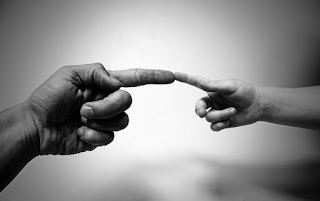SHUT UP ALREADY!
When Depression Turns Your Brain Into A Lethal Inner Critic
Ever wish there was an "off" button for your brain? Does your brain chatter to you while you're asleep, reminding you of all the mistakes you've made? Does it catastrophize incessantly until you wake up in a panic, certain your world is on the edge of catastrophe?
Welcome to the miserable land of untreated major depression and anxiety - the evil twin enemies of mental health.
There's a lot that psychiatry doesn't know about depression and anxiety - like why they usually go hand in hand. I recently saw a sadly accurate meme that said "Depression is not caring enough, Anxiety is caring too much". That's a pretty accurate description of the hell a lot of us live in on a daily basis. The depression says "go crawl under the sheets and hide" and once you get there, the anxiety says "You're such a loser bum. Look at the state of this place. You should be evicted! What if you are evicted! What will we do???!".
Treatment of depression and anxiety is a wild west of trial and error. If you've braved that lonely terrain, you know what I mean. You haven't lived until you've been told by a psychiatrist that you "failed another med" (How does a person fail a pill?)
Sadly, many of the meds that are supposed to treat major depression and anxiety give us little relief. And what marginal relief we may receive is often cancelled out by unpleasant side effects like massive weight gain, hypersomnia (sleeping too much), migraines, heart arrhythmia, dyskinesia (uncontrollable movement) and so on.
Still, if you stumble on one that works, it's worth its weight in GOLD. But it takes a lot of trial and error for most people with major depression to find a med or combination of meds that works.
The mean voice is the worst side effect of major depression and anxiety. Most sufferers report being plagued by some sort of internal critical voice. It's always intrigued me what the source of this voice is, and why does it go away when the depression and anxiety gets treated?
Many people experience the voice like an alien outside themselves, attacking them. People who suffered childhood trauma, especially childhood sexual abuse and neglect, often have a particularly malignant version of this critical voice running a tape of destruction in their heads all the time. For them, the voice is actually the abandoning child self, who adopted the side of the abuser in order to survive. Invariably, the voice echoes the attitudes of the abuser - telling them how stupid and worthless they are, and how they should be dead.
Don't for one minute underestimate the power of the mean inner critic. It's that voice that drives people to harm and even destroy themselves.
So if you haven't found a med that works yet, what can you do to get some relief from the mean inner critic? How can you shut that voice down? Here are a few suggestions.
Drag Her Into the Light of Day
The mean inner critic is a one-woman or one-man show inside your head with a captive audience. Often shining a bright light on her antics runs her off into the shadows. Try writing down exactly the mean things that the voice tells you. "You are pathetic … . . . . your family is so ashamed of you." "There's no way you'll be able to get promoted - who would promote a fat pig like you?" and so on. Write each and every one down on paper. I mean every single one. Then set it aside and go on to other things.
Later, come back and read it out loud. Really read it, and let it soak in how absurd and over-the-top crazy most of them are. And how contrary most of them are to reality. If you have a safe person in your life that you can confide in, try reading them out loud to that person and ask them to help you pinpoint the ways in which the attacks are inaccurate or just plain silly. For example, maybe you weren't promoted but you got a raise last year - that's a vote of confidence in your favor at work.
Practice Self-Compassion
Recognize the voice for what it probably is - the voice of your abuser or abusers.
You may be thinking, "but my abuser never said these things to me". That's may be true, but the things your abuser did to you damaged your sense of self, violated your boundaries in so many terrible ways and harmed you deeply. And in all those ways he was telling you, "you are worthless, this is all you're good for - to be used".
Try adopting an attitude of compassion for yourself and the things you had to do to survive your trauma. It's not always easy to do at first, but with persistence, you can start to feel real compassion for yourself. And guess what - self-compassion is the Terminator to the mean inner critic.
If you find this particularly hard, try depersonalizing it - ask yourself this: if the same things that happened to you, had happened to your best friend, what would you say to her? How would you feel about her? Better yet - what things would you NOT say to her?
Try a Little Altruism and Service
Try a few good deeds. Yeah I know, with depression saddled on your back it's hard to put on a Mary Poppins getup and go out in the world. But a little altruism is good medicine for the inner critic. You don't need to sign up to save the world every Saturday and Sunday for the rest of your life. Volunteer to pet the dogs and cats at a shelter. Surprise that friend that's always got your back with a treat. Start small. See how it feels. Work your way into it. If isolating is the fertile ground of the inner critic, engaging in some altruistic service at least gives him some competition for air-time.Find Community and Fellowship
The inner critic thrives on isolation. You could say the inner critic's first and most important task IS to isolate you - so that hers is the only voice you hear. The inner critic is weakened when other voices join the show. A really helpful way to silence the inner critic is to join a couple of support groups. There are so many now, available in so many formats - person to person, phone meetings, internet meetings etc. I would suggest person to person as the first choice, but if no such meetings are available in your area, try a phone meeting. I'd pretty much say the topic of the meeting is not that important . . . . . co-dependency, depression, mental illness in general, addiction-based groups etc. The most important thing is to find community and support. Many people who, for example, suffer from alcoholism suffer from a large range of secondary issues like food addiction, depression, anxiety etc. So ditch your inner critic and find friendship and community with like-minded folk.
If you suffer from social anxiety, pick support groups that have large attendance. Then you can sort of disappear into the crowd and listen, and won't feel as pressured to contribute as you would in a small group.
Hang in there
I know it's insufferably hard to deal with depression and anxiety. Don't give up. Keep working all the angles . . . .therapy, coaching, community, meds, exercise, spirituality, altruism, self compassion. Do it all. attack it head-on. The more weapons in your arsenal the more likely you'll beat it. You can THRIVE and, more importantly, you deserve to THRIVE, Beloved.
Stephanie Shipp
Follow THRIVE on Instagram and Facebook:
https://www.instagram.com/thrivetraumarecoverycoaching/
Recommended Podcast: The Mental Illness Happy Hour with Paul Gilmartin
Find community and understanding like nowhere else. Paul is a gifted and intuitive host and interviewer. You'll find great comfort and insight on his podcast - available on iTunes and Stitcher.
Website: https://mentalpod.com/
Recommended Websites for Finding Support and Community:
CODA (Codependents Anonymous): http://locator.coda.org/
National Alliance on Mental Illness (NAMI): https://www.nami.org/
The Samaritans (UK): https://www.samaritans.org/
Survivors of Incest Anonymous: https://siawso.org/
Adult Survivors of Childhood Abuse: http://www.ascasupport.org/events.php
Support for Sufferers of Combat PTSD: https://maketheconnection.net/resources
Overeaters Anonymous: https://oa.org/members/meetings/
RAINN (Rape, Abuse and Incest National Network): https://centers.rainn.org/
Support for Family & Friends of Alcoholics: https://al-anon.org/
SNAP (Survivors Network of Those Abused by Priests):
https://www.snapnetwork.org/support_groups
Alcoholics Anonymous Meetings Locator: https://aa.org/pages/en_US/find-local-aa
The Samaritans (UK): https://www.samaritans.org/
Survivors of Incest Anonymous: https://siawso.org/
Adult Survivors of Childhood Abuse: http://www.ascasupport.org/events.php
Support for Sufferers of Combat PTSD: https://maketheconnection.net/resources
Overeaters Anonymous: https://oa.org/members/meetings/
RAINN (Rape, Abuse and Incest National Network): https://centers.rainn.org/
Support for Family & Friends of Alcoholics: https://al-anon.org/
SNAP (Survivors Network of Those Abused by Priests):
https://www.snapnetwork.org/support_groups
Alcoholics Anonymous Meetings Locator: https://aa.org/pages/en_US/find-local-aa




Comments
Post a Comment